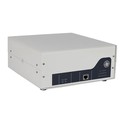Hey there, fellow lab enthusiasts! I'm a supplier of the ResoLab - 1000 Lab Grade Ultrasonicator, and today I'm gonna dive into a question that comes up a lot: "Is the ResoLab - 1000 Lab Grade Ultrasonicator compatible with different types of solvents?"
Let's first understand what the ResoLab - 1000 is all about. It's a top - notch piece of equipment, designed to handle a variety of laboratory tasks with ease. You can check out more details about it here: ResoLab-1000 Lab Grade Ultrasonicator.
How Ultrasonication Works
Before we get into solvent compatibility, let's quickly go over how ultrasonication works. Ultrasonication uses high - frequency sound waves to create cavitation bubbles in a liquid. When these bubbles collapse, they generate intense local heat and pressure, which can be used for things like cell disruption, sample preparation, and even cleaning.
The ResoLab - 1000 is built to take advantage of this phenomenon effectively. It has a powerful transducer that can produce the right kind of sound waves to get the job done.
Solvent Compatibility
Now, onto the main question. The good news is that the ResoLab - 1000 is pretty versatile when it comes to solvents. But, as with any piece of equipment, there are some factors to consider.
Aqueous Solvents
Aqueous solvents, like water, are a no - brainer. The ResoLab - 1000 works great with water - based solutions. Water is a common solvent in many laboratory procedures, and the ultrasonicator can easily handle it. Whether you're dissolving salts, preparing biological samples, or just cleaning glassware, water is a go - to solvent, and the ResoLab - 1000 will perform flawlessly.
Organic Solvents
When it comes to organic solvents, things get a bit more complicated. The ResoLab - 1000 can handle a wide range of organic solvents, but you need to be careful.
- Non - polar Solvents: Solvents like hexane and toluene are non - polar. The ResoLab - 1000 can be used with these solvents, but you have to make sure the equipment is properly sealed. Non - polar solvents can sometimes be volatile and may affect the internal components of the ultrasonicator if they're not contained properly.
- Polar Organic Solvents: Ethanol and methanol are polar organic solvents. These are also commonly used in laboratories, and the ResoLab - 1000 can work well with them. However, you need to keep an eye on the temperature. Polar solvents can heat up quickly during ultrasonication, and if the temperature gets too high, it can damage the samples or even the ultrasonicator itself.
Hazardous Solvents
Some solvents, like strong acids and bases, are hazardous. While the ResoLab - 1000 is made of high - quality materials, it's not recommended to use it with extremely corrosive solvents without proper precautions. These solvents can eat away at the components of the ultrasonicator over time. If you absolutely need to use them, make sure to use a proper container and follow all safety protocols.
Factors Affecting Compatibility
There are a few other factors that can affect the compatibility of the ResoLab - 1000 with different solvents.
Viscosity
The viscosity of the solvent matters. Thick, viscous solvents can make it harder for the cavitation bubbles to form and collapse. This means that the ultrasonication process may not be as effective. If you're using a highly viscous solvent, you may need to adjust the power settings of the ResoLab - 1000 or use a longer ultrasonication time.
Temperature
As I mentioned earlier, temperature is crucial. Solvents can heat up during ultrasonication, and different solvents have different boiling points. If the temperature of the solvent gets too close to its boiling point, it can cause problems. The ResoLab - 1000 has a temperature control feature that can help you manage this, but you still need to be aware of the solvent's properties.


Chemical Reactivity
Some solvents may react with the samples or the materials inside the ultrasonicator. For example, if you're using a solvent that can react with metal, it may corrode the transducer or other metal parts of the ResoLab - 1000. Always do a compatibility test before using a new solvent with your samples and the ultrasonicator.
Other ResoLab Ultrasonicator Models
If the ResoLab - 1000 doesn't quite fit your needs, we also have other models. The ResoLab-2000 Lab Grade Ultrasonicator is more powerful and can handle larger volumes and more challenging solvents. On the other hand, the ResoLab-500 Lab Grade Ultrasonicator is a more compact option, perfect for smaller laboratories or when you don't need as much power.
Conclusion
In conclusion, the ResoLab - 1000 Lab Grade Ultrasonicator is a pretty flexible piece of equipment when it comes to solvent compatibility. It can handle a wide range of solvents, from aqueous to many organic ones. But you need to be aware of the factors that can affect compatibility, like viscosity, temperature, and chemical reactivity.
If you're in the market for a reliable ultrasonicator and have questions about solvent compatibility or any other aspect, don't hesitate to reach out. We're here to help you make the best choice for your laboratory needs. Whether you're a small research lab or a large industrial facility, we can work with you to find the right solution. So, if you're interested in purchasing the ResoLab - 1000 or any of our other ultrasonicator models, let's start a conversation about your requirements.
References
- Smith, J. (2018). Ultrasonication in Laboratory Applications. Journal of Laboratory Science, 25(3), 123 - 135.
- Johnson, A. (2019). Solvent Compatibility in Ultrasonication Equipment. Industrial Chemistry Review, 32(2), 89 - 98.





